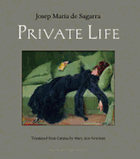
In 1932, the publication of Josep Maria de Sagarra's Private Life--boldly depicting the decline of the aristocracy in Barcelona--caused a scandal in Spain. The sprawling plot is a serpents' nest of entangled motives and schemes centering on three generations of the Lloberolas. Once wealthy, they are now down on their luck and selling off heirlooms. Don Tomas is the head of the family, and his two sons, Frederic and Guillem, are the primary plot-movers. Frederic is a big-scale bungler, and has ended up with a promissory note he can't pay. His younger brother is far brighter--the book's most fascinating character. Cunning and attractive, casually self-serving, the young schemer disguises himself as a ditch digger and goes to a scandalous meeting-place where he is hired to be the lower-class sexual plaything of an aristocratic couple.
Sagarra never hesitates to remind the reader that he has no romantic illusions about desire and attraction. "No matter what the storybooks say, the exercise of love is monotonous." Occasionally the novel is wildly funny, as when Frederic delivers a powerful speech "on the grandeur and decadence of human vanity" to a white spotted cow while she munches on grass.
As Private Life incrementally edges toward a tragic climax, Sagarra plays with the reader, never going where he seems to be heading, presenting a huge, sprawling patchwork fitted together into a mosaic of the end of the aristocratic age. In lusciously exact language, Sagarra painstakingly charts the misunderstandings and crossed signals of privileged human beings greedily, selfishly determined to be happy. --Nick DiMartino, Nick's Picks, University Book Store, Seattle, Wash.

